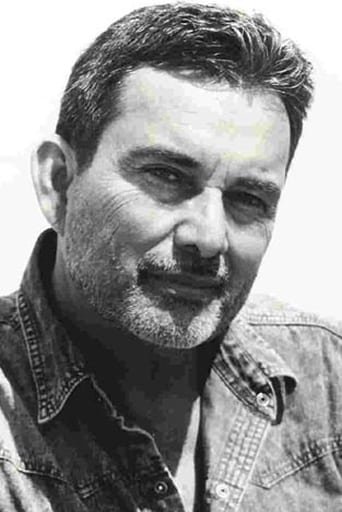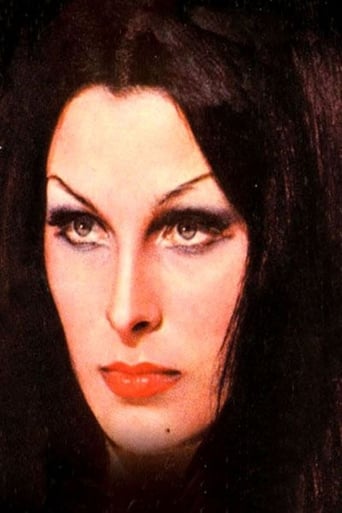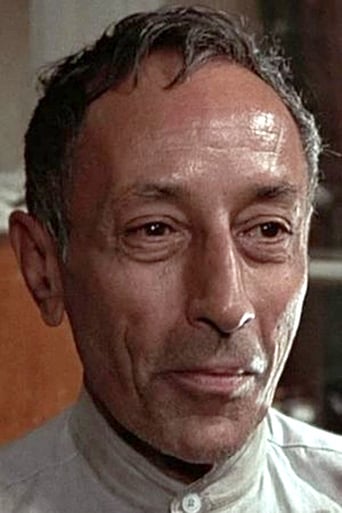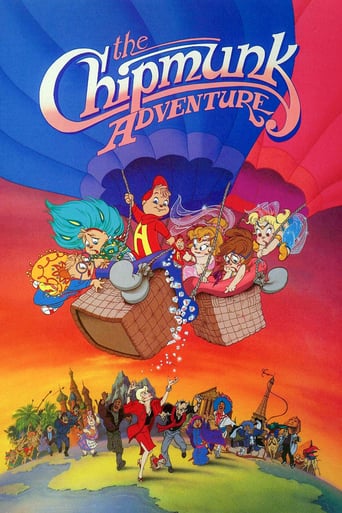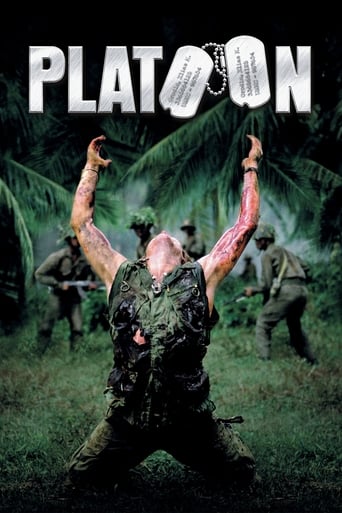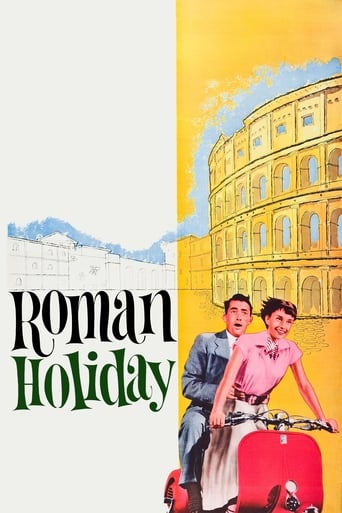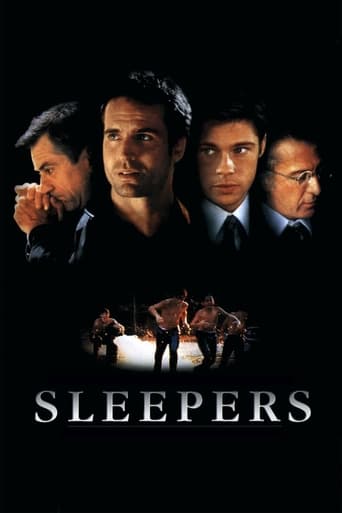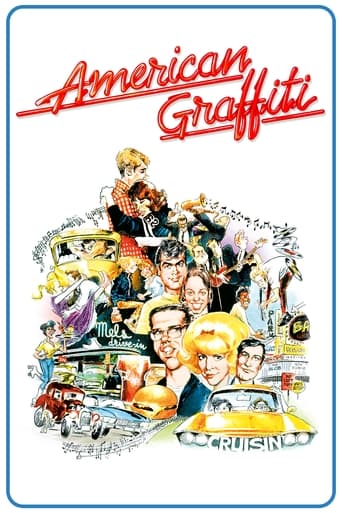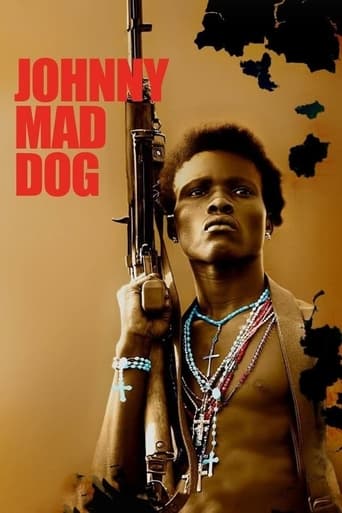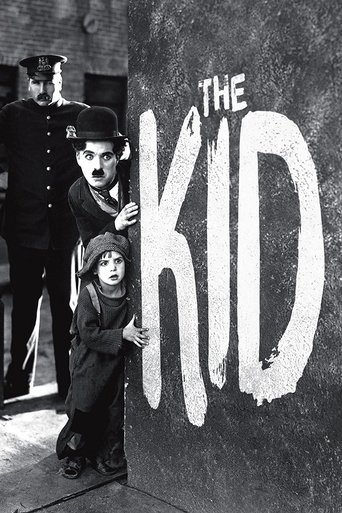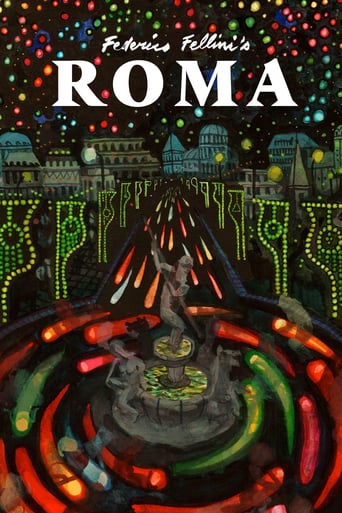
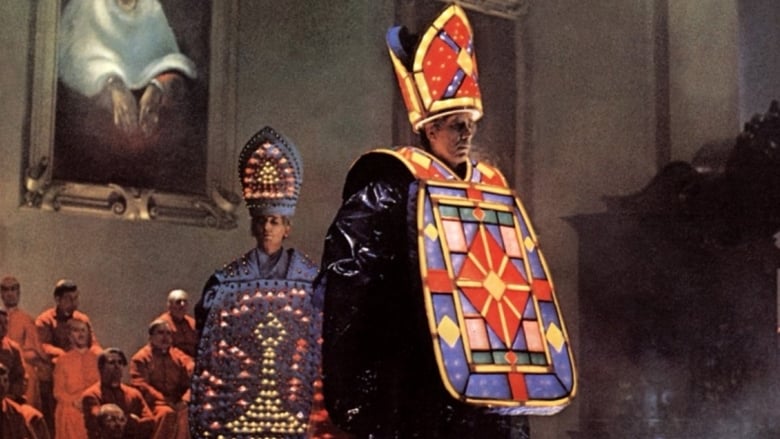
Roma (1972)
A virtually plotless, gaudy, impressionistic portrait of Rome through the eyes of one of its most famous citizens.
Watch Trailer
Cast


Similar titles
Reviews
Lack of good storyline.
Just perfect...
The movie turns out to be a little better than the average. Starting from a romantic formula often seen in the cinema, it ends in the most predictable (and somewhat bland) way.
The story, direction, characters, and writing/dialogue is akin to taking a tranquilizer shot to the neck, but everything else was so well done.
I couldn't help thinking, during one of the rare quiet moments of this extravaganza, how wonderful it would have been if directors with the style, ability and panache of Fellini, could have made such a film about their own capital city. What an archive we would then have had to gaze upon in wonder as we do here, at Rome. Captivating from the start this visual and plot less but loving portrait takes us on a journey through the director's eyes. Although there is no plot and this is more documentary we do begin with fictionalised titbits from Fellini's childhood and his subsequent arrival in Rome. There are fantastic sequences that swirl around street diners and street furniture and traffic. Not perhaps how I would choose to eat but so convincingly Italian. The same with impressions of entertainment halls and brothels, not to forget the moving underground scenes, all shot so immaculately and with such stunning accompanying music. Towards the end Fellini allows himself a rather large poke at the Catholic church and the pope with an amazingly over the top ecclesiastical fashion show that even outdoes the works of our own Ken Russell. Fabulous and exciting with barely a pause for breath.
Fellini's ROMA imposingly alternates between two paralleled narratives in Rome, his salad days during the WWII and the beginning of 1970s, when he is an eminent filmmaker making a new film about the city, erratically charts its local customs and folk culture to pay homage to an ancient and great city. Structurally, the film doesn't stick to a linear one, instead it disguises with a pseudo-documentary style, in fact, most of the scenes were re-constructed in Cinecittà, however, Fellini stuns audience again with his majestic undertaking which significantly blurs the line between fiction and non-fiction.The film is not just an ode to the city, more prominently, it is the clashes between past and present that reverberate strongly today. His young self (played by Falcon), a doe-eyed townie arrives in Rome for college, enjoys a boisterous dinner in the street trattoria with the entire neighbourhood, watches a shoddy variety show with crude spectators which would be interrupted by an air raid, flirts with the brothel for the first time; when time leaps forward to the 1970s, the flower-child generation is consuming with alienation and torpidity, a poetic episode of the underground metro construction team encounters an undiscovered catacomb, where fresh air breaches into the isolated space and ruins all its frescoes in a jiffy. A superlative conceit encapsulates the dilemma between modern civilisation and ancient heritage.There is no absence of Fellini-esque extravaganza, the brothels during wartime are quintessentially embellished with crazed peculiarity and vulgarity for its zeitgeist and national spirit, where sex can be simply traded as commodity without any emotional investment. The most striking one, is the flamboyant fashion-show of church accouterments organised by Princess Domitilla (De Doses) for Cardinal Ottaviani (Giovannoli), consummated in an overblown resurrection of the deceased Pope, it is sacrilege in its most diverting form, only Fellini can shape it with such grand appeal and laugh about it.Two notable celebrity cameos, Gore Vidal, expresses his love of the city from an expatriate slant, and more poignant one is from Anna Magnani, her final screen presence - Ciao, buonanotte! - a sounding farewell for this fiery cinema icon. The epilogue, riding with a band of motorists, visiting landmarks in the night, Fellini's ROMA breezily captures this city's breath of life, sentimental to its distinguished history, meanwhile vivacious even farcical in celebrating its ever-progressing motions, a charming knockout!
Whether for literature, theater or any art of storytelling, there can't be a plot without characters to drive it. Yet characters don't imply a specific plot and this might be the area where theater slightly surpasses literature, as an art of 'presence' and 'personalities' mirroring our condition. More than anything, it's a show, an invitation for eyes, for ears, for feelings. And emotions can do without plots.And here we have Fellini draining his talent from the Antic Roman-Greek tragicomedy, Commedia del' Arte, Opera and maybe more than anything, from his Italian roots so devoted to fun and entertainment. More than any other director, Fellini understood the virtue of Cinema as a new form of theater, a show that doesn't rely on plots or screen writing techniques, he shoots first and we ask the question later. And what a show! Fellini will forever be admired and never equaled, thanks to his unique talent to inhabit his films with unforgettable galleries of characters: eccentric, larger-than-life, decadent, greedy, gluttonous, sensual, ugly, outcast, colorful faces with anonymous names and universal and timeless appeals. These people feel real because they FEEL. And we're so hypnotized by the images that we forget to care about a plot.My repetition of the word 'plot' is only an anticipation of some rational comments on Fellini's "Roma" or, "Fellini's Roma", I must say. Yes, the film doesn't have a plot, even to those who set their minds for a surrealist tour orchestrated by the ultimate cinematic ringleader, Il Maestro Fellini. Even "8½" chronicled the very process of film-making from the author's boiling mind, even the previous "Fellini's Satyricon" was a take on a myth that had a story to tell, no matter how disjointed it felt. Even the nostalgic vignettes of "Amarcord" made a coherent ensemble, but "Fellini's Roma" has no focus whatsoever.But does it need one when the scope is so large, when Rome is the main protagonist? Rome... such a myth of a city that it transcends all the periods, visions and artistic possibilities. The film is constantly inhabited by Rome's aura from Fellini's perspective, hence the title. For "Satyricon", it was a legal necessity to distinguish from two films with the same title, to establish Fellini's independence from the original myth. "Roma" similarly establishes Fellini's independence, except that this time, no other vision of Rome could ever compete with Fellini's or approach the town with the same masterful audacity.Now, why a film about "Rome"? My guess is that it's one of the few privileged cities whose name evoke fascinating contradictions. "Rome is the city of illusions. Not only by chance you have here the church, the government, the cinema. They each produce illusions." This is Gore Vidal speaking in a memorable cameo and it's probably the closest rational conclusion that can come out of this mesmerizing mess. And "illusion" is the key word, whether it's the illusion of church that ignited the faith of generation of Italians without abjuring them from that lust for life and voluptuous bodies so rooted in the Italian lifestyle, for politics that have plunged post-War Italy into the darkness of fascism and yes, even Cinema doesn't escape criticism.Behind Fellini's eye, Rome oscillates between dazzling magnificence and nightmarish decadence. Fellini appears twice, as a young idealistic man who discovers the town, eats some spaghetti with the population, goes to the music-hall or visits a brothel, and the older real-life Fellini discussing with the new generation of Romans on how to make an accurate portrayal of the city. And it's ironic how nothing changed much between these times, "O Tempora! O Mores", yet Mussolini's Italy was as noisy, lusty and turbulent as in 1972, and ironically, "Roma"'s self-referential aspect illustrates the fact that both embellishment and derision rely on caricatures, the very illusions Fellini admits in his own filmmaking process.And illusion contributes to the film's most enigmatic moments: a parade of prostitutes tempting their clients, with sensual bodies to better hide the lucid tiredness in their faces, the scene followed by a sort of ecclesiastic fashion contest. Through the intriguing parallel, the iconoclast Maestro doesn't attack church but the myth of virtue that ignores the real sacred Trinity outside the Vatican border: life, love and lust. His fantasy vision works like a missing link between the eternal myth of Roma and reality. When thinking of Roma, we'll either have a vision of the Coliseum, of a fat Italian with huge bosoms serving a large plate of pasta on a summer evening, or maybe a beautiful red-haired and red-dressed woman sensually dancing at the moonlight of a lamppost, perhaps the greatest cinematic allegory of any town.And if the film works without characters, it does as well without a plot because Rome is that sensual woman with a history, a present, a future and a past. You can't dig a subway tunnel without bumping on archaeological relics hidden in its prolific womb, like a woman who hasn't revealed all her secrets. And one of the most poignant moments occurs when engineers find Antic frescoes in a tunnel, preserved just as if they were painted the day before, before oxygen destroys them instantly. That's the price you pay when you have a clear glimpse on reality, imagining how Romans were would have been more salutary for its (or her) own history. And this is the power of imagination, of illusion over reality or any myth of grandeur. No need for a plot when you have such a wonderful protagonist that encapsulates all the values Italians will forever stand for, and who more entitled than Fellini to share with us a part of his vision? And no need for specific characters when you have the Italians. A famous Italian actor, if I recall correctly, said something like "In Italy, there are about thirty millions actors, the rest of the population star in movies". This quote could have been the film's tag-line.
I have accidentally stumbled upon this film. I have watched his known masterpieces and liked them very much. But this is something special. This really breaks with the common use for film as a simple way to illustrate an epic story and goes beyond. Something achieved only by few, say Akira Kurosawa in Yume / Dreams. This is also unique as far as I know because the main / only character is a city. That has been tried even in the recent years with Paris, je t'aime, but they failed. Sure, if your kind of entertainment is Xmen Meet Rambo to Kill the Out-of-space Infidels you can bet you are going to be bored out of your head. Otherwise this is worth every minute of the two hours. And every time you get to see it more details and symbols are going to reveal themselves.Contact me with Questions, Comments or Suggestions ryitfork @ bitmail.ch


